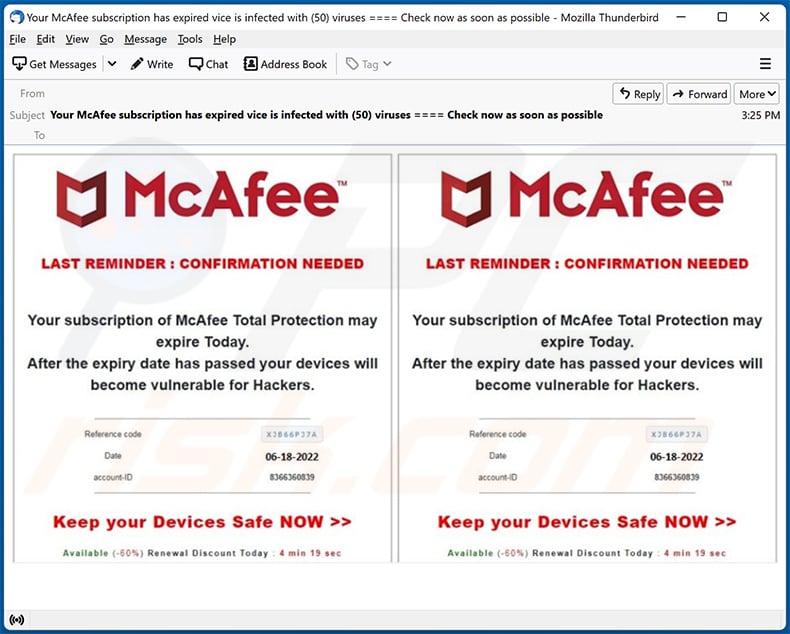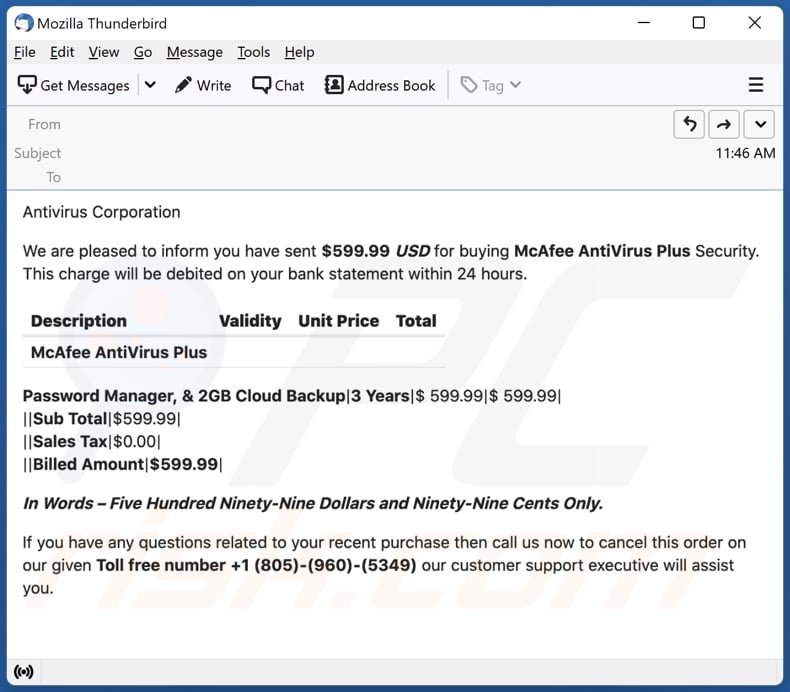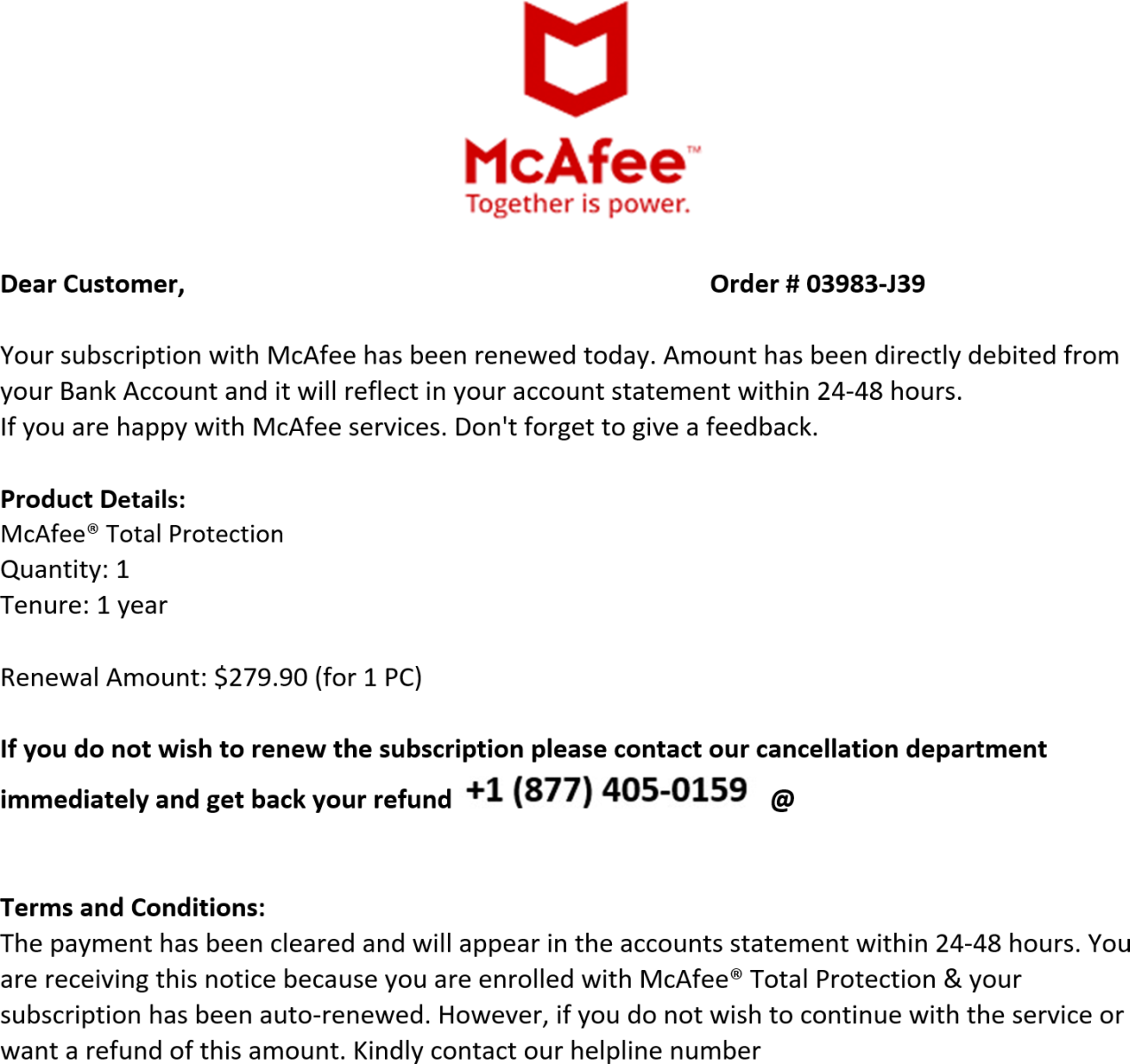Have you ever received an email that looks like it's from McAfee, but you're not sure if it's real?
McAfee antivirus email scams are a type of phishing scam that attempt to trick you into giving up your personal information, such as your credit card number or Social Security number.
These scams often look very convincing, and they may even use the McAfee logo and branding.
Read also:The Ultimate Guide To Blue Bloods Cast Changes Discover The Latest Updates
However, there are some key things to look for that can help you spot a McAfee antivirus email scam:
- The email address of the sender will not be from a McAfee domain.
- The email will contain misspellings and grammatical errors.
- The email will ask you to click on a link to a website that looks like the McAfee website, but is actually a fake website designed to steal your personal information.
If you receive an email that you think may be a McAfee antivirus email scam, do not click on any links in the email and do not provide any personal information. Instead, report the email to McAfee and delete it.
Learn more about McAfee antivirus email scams.
mcafee antivirus email scam
McAfee antivirus email scams are a type of phishing scam that attempt to trick you into giving up your personal information.
- Phishing
- McAfee
- Scam
- Personal information
- Malware
- Security
These scams often look very convincing, and they may even use the McAfee logo and branding. However, there are some key things to look for that can help you spot a McAfee antivirus email scam:
- The email address of the sender will not be from a McAfee domain.
- The email will contain misspellings and grammatical errors.
- The email will ask you to click on a link to a website that looks like the McAfee website, but is actually a fake website designed to steal your personal information.
If you receive an email that you think may be a McAfee antivirus email scam, do not click on any links in the email and do not provide any personal information. Instead, report the email to McAfee and delete it.
Read also:Find Your Icloud Devices Quickly And Easily With Icloudcomfind
1. Phishing
Phishing is a type of online fraud that attempts to trick you into giving up your personal information, such as your credit card number or Social Security number. Phishing scams often take the form of emails that look like they are from a legitimate company, such as your bank or a government agency.
- How phishing works
Phishing emails typically contain a link to a fake website that looks like the real thing. When you click on the link, you are taken to the fake website, where you are asked to enter your personal information. The scammer can then use your personal information to steal your identity or your money.
- How to spot a phishing email
There are a few things you can look for to spot a phishing email:
- The email address of the sender does not match the domain name of the company that the email is supposedly from.
- The email contains misspellings and grammatical errors.
- The email asks you to click on a link to a website that you do not recognize.
- The email asks you to provide personal information, such as your credit card number or Social Security number.
- What to do if you receive a phishing email
If you receive a phishing email, do not click on any links in the email and do not provide any personal information. Instead, report the email to the company that the email is supposedly from and delete it.
Phishing is a serious threat to online security. By being aware of the tactics that scammers use, you can protect yourself from phishing scams.
2. McAfee
McAfee is a leading cybersecurity company that provides antivirus software, firewalls, and other security solutions to consumers and businesses. McAfee antivirus software is designed to protect computers from viruses, malware, and other online threats.
McAfee antivirus email scams are a type of phishing scam that attempt to trick people into giving up their personal information, such as their credit card number or Social Security number. These scams often look very convincing, and they may even use the McAfee logo and branding.
The connection between McAfee and mcafee antivirus email scams is that the scammers are using the McAfee name and branding to trick people into thinking that the emails are legitimate. This is a serious problem because it can lead to people losing their personal information and money.
Here are some tips to help you avoid mcafee antivirus email scams:
- Be suspicious of any emails that you receive from McAfee that you were not expecting.
- Do not click on any links in the email.
- Do not provide any personal information in the email.
- Report the email to McAfee.
By following these tips, you can help protect yourself from mcafee antivirus email scams.
3. Email
Email is a method of exchanging messages between people over electronic devices. In the context of mcafee antivirus email scams, email is the primary medium through which the scam is perpetrated.
- Delivery of scam messages
McAfee antivirus email scams are typically delivered via email. The emails may appear to come from McAfee, but they are actually sent by scammers. The emails often contain links to fake McAfee websites or attachments that contain malware.
- Phishing attacks
McAfee antivirus email scams often use phishing techniques to trick people into giving up their personal information. The emails may contain links to fake McAfee websites that look like the real thing. When people enter their personal information on these websites, the scammers can steal it and use it to commit fraud.
- Malware distribution
McAfee antivirus email scams can also be used to distribute malware. The emails may contain attachments that contain malware. When people open these attachments, the malware is installed on their computers. The malware can then steal personal information, damage files, or even take control of the computer.
- Spam filtering
Spam filters can help to protect people from mcafee antivirus email scams. Spam filters can identify and block emails that are likely to be scams. However, spam filters are not always perfect, and some mcafee antivirus email scams may still get through.
Email is an essential part of modern life. However, it is important to be aware of the risks associated with email, including mcafee antivirus email scams. By being aware of these risks, you can take steps to protect yourself from them.
4. Scam
A scam is a fraudulent scheme designed to deceive people and obtain their money or personal information. McAFEE ANTIVIRUS EMAIL SCAM is a type of scam that uses the McAfee name and branding to trick people into thinking that the emails are legitimate. These scams often look very convincing, and they may even use the McAfee logo and branding. The scammers may also use phishing techniques to trick people into giving up their personal information, such as their credit card number or Social Security number.
McAfee antivirus email scams are a serious problem because they can lead to people losing their personal information and money. In some cases, these scams can even lead to identity theft. It is important to be aware of these scams and to take steps to protect yourself from them.
Here are some tips to help you avoid mcafee antivirus email scams:
- Be suspicious of any emails that you receive from McAfee that you were not expecting.
- Do not click on any links in the email.
- Do not provide any personal information in the email.
- Report the email to McAfee.
By following these tips, you can help protect yourself from mcafee antivirus email scams.
5. Personal information
Personal information is any information that can be used to identify an individual, such as their name, address, phone number, email address, or Social Security number. McAFEE ANTIVIRUS EMAIL SCAM is a type of scam that uses the McAfee name and branding to trick people into thinking that the emails are legitimate. These scams often look very convincing, and they may even use the McAfee logo and branding. The scammers may also use phishing techniques to trick people into giving up their personal information, such as their credit card number or Social Security number.
Personal information is a valuable commodity to scammers. They can use it to commit identity theft, fraud, or other crimes. In the case of mcafee antivirus email scams, the scammers may use your personal information to:
- Steal your identity and open new accounts in your name.
- Make unauthorized purchases using your credit card or debit card.
- File fraudulent tax returns and claim your refund.
- Take out loans in your name.
It is important to be aware of the risks of mcafee antivirus email scams and to take steps to protect your personal information. Here are some tips to help you stay safe:
- Be suspicious of any emails that you receive from McAfee that you were not expecting.
- Do not click on any links in the email.
- Do not provide any personal information in the email.
- Report the email to McAfee.
By following these tips, you can help protect yourself from mcafee antivirus email scams and keep your personal information safe.
6. Malware
Malware is a type of malicious software that can damage or disable a computer system. Malware can come in many forms, including viruses, worms, and trojan horses. McAfee antivirus email scams often use malware to infect computers and steal personal information.
- How malware works
Malware can infect computers in a variety of ways, including through email attachments, malicious websites, and USB drives. Once malware is installed on a computer, it can damage files, steal personal information, or even take control of the computer.
- Types of malware
There are many different types of malware, including:
- Viruses: Viruses are programs that can replicate themselves and spread from one computer to another. Viruses can damage files and steal personal information.
- Worms: Worms are similar to viruses, but they do not need to attach themselves to a file to spread. Worms can spread through networks and infect multiple computers.
- Trojan horses: Trojan horses are programs that appear to be legitimate, but they actually contain malicious code. Trojan horses can steal personal information or damage files.
- How to protect yourself from malware
There are a number of things you can do to protect yourself from malware, including:
- Use a reputable antivirus program.
- Keep your software up to date.
- Be careful about what you download from the internet.
- Do not open attachments from unknown senders.
- Be careful about what you click on in emails.
Malware is a serious threat to computer security. By following these tips, you can help protect yourself from malware and keep your computer safe.
7. Security
Security is a critical aspect in the context of "mcafee antivirus email scam", as it highlights the importance of protecting personal information and computer systems from malicious threats and fraudulent activities.
- Protection from Phishing Attacks
McAfee antivirus email scams often employ phishing techniques to deceive individuals into revealing sensitive information such as passwords, credit card numbers, and personal data. Robust security measures, including robust email filtering systems and user education on phishing red flags, can help prevent these attacks and safeguard personal information.
- Malware Prevention
Malware, including viruses, worms, and trojan horses, can be spread through malicious email attachments or links. Antivirus software plays a crucial role in detecting and eliminating malware, preventing potential damage to computer systems and protecting sensitive data from unauthorized access.
- Safeguarding Personal Information
Personal information, such as names, addresses, and financial details, can be compromised through these scams. Implementing strong data encryption measures, enforcing secure password protocols, and raising awareness about the importance of protecting personal information can mitigate the risks associated with mcafee antivirus email scams.
- Maintaining System Integrity
Maintaining the integrity of computer systems is vital in preventing unauthorized access and data breaches. Regular software updates, implementing firewalls, and monitoring system activity can help maintain system integrity and reduce the likelihood of successful cyber attacks.
By understanding the connection between security and mcafee antivirus email scams, individuals can take informed steps to protect themselves from these malicious attempts. Implementing robust security measures, educating users, and promoting cyber hygiene practices can contribute to a safer and more secure digital environment.
Frequently Asked Questions about McAfee Antivirus Email Scams
McAfee antivirus email scams are a common type of phishing scam that attempts to trick people into giving up their personal information. These scams can be very convincing, so it's important to be aware of the signs and know how to protect yourself.
Question 1: How can I spot a McAfee antivirus email scam?
Answer: There are a few key things to look for:
- The email address of the sender will not be from a McAfee domain.
- The email will contain misspellings and grammatical errors.
- The email will ask you to click on a link to a website that looks like the McAfee website, but is actually a fake website designed to steal your personal information.
Question 2: What should I do if I receive a McAfee antivirus email scam?
Answer: If you receive a McAfee antivirus email scam, do not click on any links in the email and do not provide any personal information. Instead, report the email to McAfee and delete it.
Question 3: How can I protect myself from McAfee antivirus email scams?
Answer: There are a few things you can do to protect yourself from McAfee antivirus email scams:
- Be suspicious of any emails that you receive from McAfee that you were not expecting.
- Do not click on any links in the email.
- Do not provide any personal information in the email.
- Report the email to McAfee.
Question 4: What are the consequences of falling for a McAfee antivirus email scam?
Answer: If you fall for a McAfee antivirus email scam, you may lose your personal information, such as your credit card number or Social Security number. This information can be used to commit identity theft or fraud.
Question 5: Where can I get more information about McAfee antivirus email scams?
Answer: You can find more information about McAfee antivirus email scams on the McAfee website or by contacting McAfee customer support.
Summary: McAfee antivirus email scams are a serious threat to your personal information. By being aware of the signs of these scams and taking steps to protect yourself, you can help keep your information safe.
Transition to the next article section: For more information on how to protect yourself from online scams, please see our article on "How to Spot and Avoid Phishing Scams".
Conclusion
McAfee antivirus email scams are a serious threat to your personal information. These scams use phishing techniques to trick people into giving up their personal information, such as their credit card number or Social Security number. This information can then be used to commit identity theft or fraud.
It is important to be aware of the signs of McAfee antivirus email scams and to take steps to protect yourself from them. By being vigilant and taking the necessary precautions, you can help keep your personal information safe.


